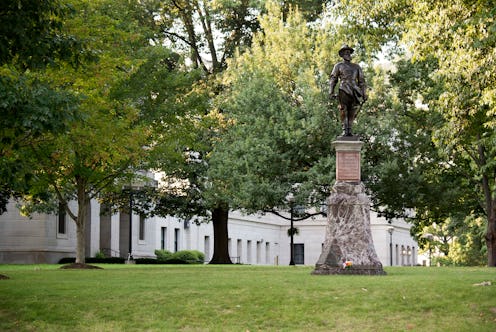News
What To Say To People Who Don't Think Confederate Monuments Are Absolutely About Upholding White Supremacy

In light of the white supremacist rally in Charlottesville, Virginia, the topic of Confederate monuments and symbols has once again pervaded national discourse. The white supremacists and neo-Nazis who gathered in Charlottesville were defending a statue of Confederate Gen. Robert E. Lee, but there are at least 700 Confederate monuments and statues scattered across the country, according to the Southern Poverty Law Center. Those who defend the statues claim that they "preserve American history," but in reality, Confederate statues are symbols of white supremacy.
Saying this outright, however, might not immediately convince someone who staunchly defends these statues. In fact, there are several arguments that routinely crop up in defense of Confederate monuments, and it's worth taking some time to examine them in order to construct an informative but firm response.
To effectively argue in favor of removing Confederate statues, there are some important points to keep in mind. For example, it's important to be able to cite specific historical and global examples, and to be familiar with the contexts in which Confederate monuments were built. Let's take a look at these points, and come up with some convincing responses. Listed below are some of the most prominent arguments made in defense of Confederate monuments, followed by potential counterarguments you can use to refute them.
1. Confederate monuments preserve history.
Response:
What history are people talking about? What was Donald Trump referring to, for example, when he tweeted that these monuments celebrate "the history and culture of our great country"?
Confederate monuments tend to honor figures who fought in favor of maintaining slavery, or otherwise glorify the cause of the Confederacy. This history does not need to be "preserved"; the consequences of slavery can be felt to this day. The Confederacy's cause, meanwhile, was a white supremacist one; to defend slavery, Confederates had to operate on the premise that a racial hierarchy made sense.
It is also worth noting that Lee himself opposed the construction of Confederate war monuments; he swore his allegiance to the Union after the Civil War and urged the country to "obliterate the marks of civil strife."
2. Confederate statues are about heritage, not hate.
Response:
As Barrett Holmes Pitner wrote for The Daily Beast, these two concepts unfortunately go hand in hand when it comes to the Confederacy. A celebration of Confederate "heritage" is a celebration of white supremacy, because that is the legacy and history that the Confederacy left behind.
"Yet the most offensive aspect of the 'Heritage not Hate' argument is how it continues the social standard of limiting Southern black voices with the attempt of reducing us to irrelevancy," Pitner pointed out. "Southern culture arose when black Americans were not considered people, and the social norm has always been one in which blacks have had limited agency over their lives. This argument sustains this structure because a Southern heritage must remain about white existence, and nothing else."
3. You can't change history, but you can learn from it.
Response:
Trump was right to make this particular point, but was completely incorrect in his application of the idea. We don't learn history from statues, and the construction of these particular statues peaked during periods of history when white Americans attempted to enforce racial segregation. In fact, many of these monuments were built during the Jim Crow era to reaffirm white supremacy.
If we are to learn something from history, perhaps we should look to German history as an example. Following World War II, Germany banned Nazi symbols and hate speech. German law also criminalizes Holocaust denial. German Chancellor Angela Merkel called for "clear, forceful action" against the "racist, far-right violence" in Charlottesville, but we likely wouldn't see similar events in Germany today. To take a recent example, an American tourist was punched by a stranger after performing a Nazi salute in Dresden.
4. Laws against certain symbols are censorship, and violate principles of free speech.
Response:
Germany's policies aren't censorship, and are certainly not an attempt to erase history. And on a systemic level, Germany nonetheless understands what many Americans do not: Symbols that celebrate oppression and violence serve to invalidate the lived experiences of those who have been affected by that oppression. If we keep Confederate monuments in place, it implies that we are comfortable with celebrating and hearkening back to periods of history during which black Americans weren't even considered human.
We learn history by reading about it, talking to one another, and having thoughtful discussions about the ways in which violent institutions have shaped the country we currently live in. But unless Confederate statues are suddenly able to speak to us about the atrocities they committed in the name of keeping people enslaved, it is not likely that we will learn much from them.